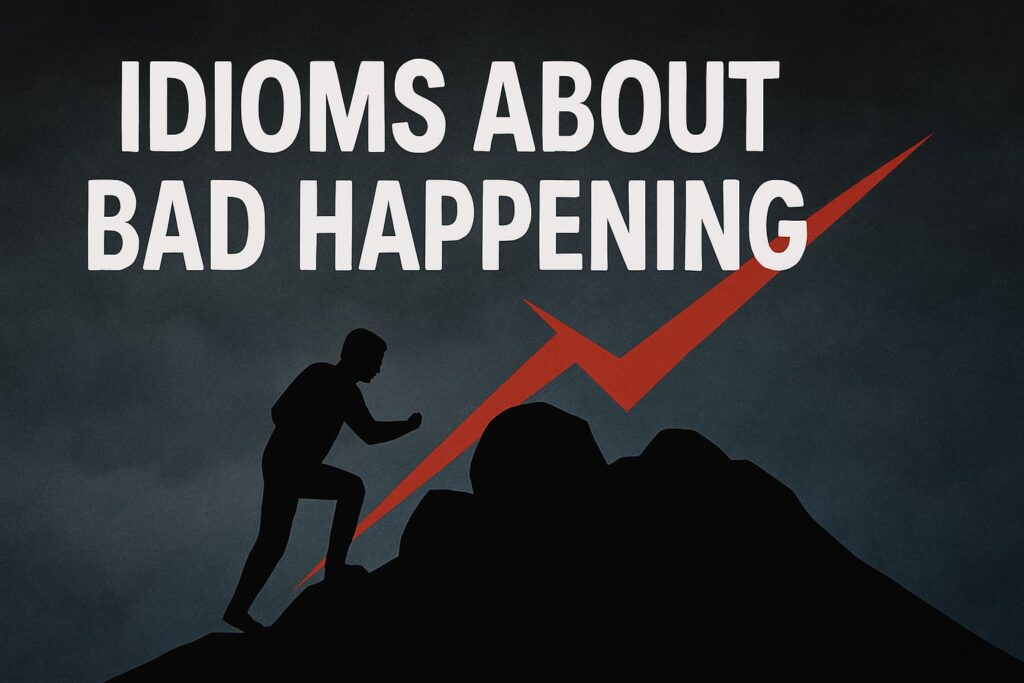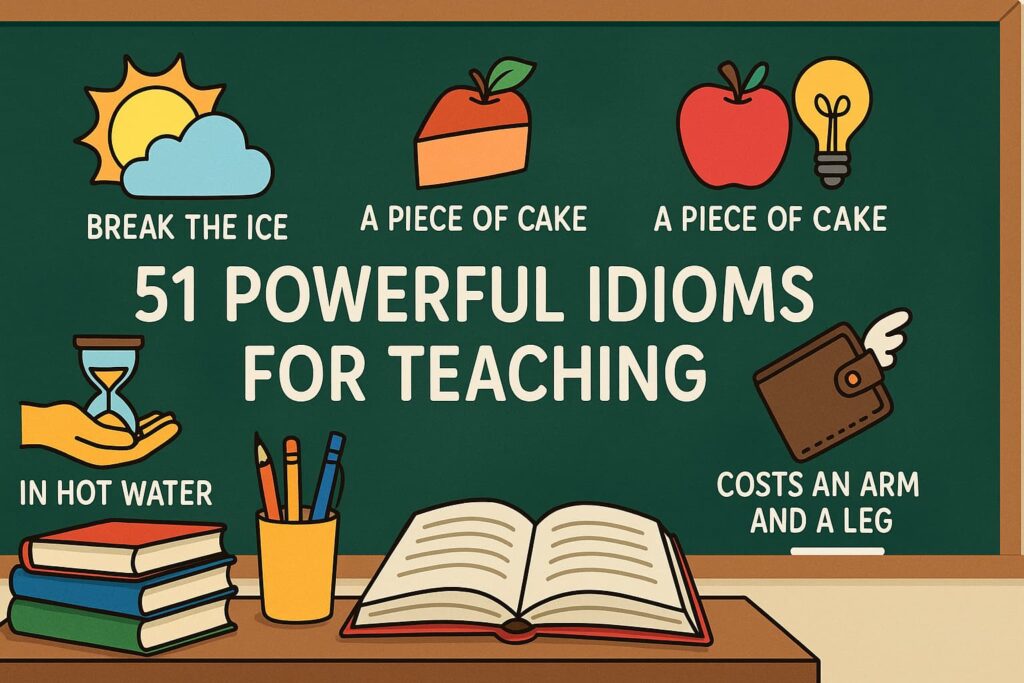This comprehensive guide explores idioms that describe adverse situations, misfortune, and difficulties. These expressions are widely used in professional and everyday contexts to vividly communicate challenges and setbacks. The content includes 41 idioms with meanings, example sentences, and alternative phrases, followed by an additional table of idioms with their meanings. To reinforce learning, an exercise with fill-in-the-blank questions is provided, with answers listed separately.
41 Idioms About Bad Happening
- Add Fuel to the Fire
Meaning: To make a bad situation worse.
In a Sentence: Telling him he was wrong only added fuel to the fire.
Other Ways to Say: Make things worse, stir the pot. - Out of the Frying Pan and Into the Fire
Meaning: Going from a bad situation to a worse one.
In a Sentence: Quitting his stressful job only put him out of the frying pan and into the fire.
Other Ways to Say: From bad to worse, jump into deeper trouble. - Between a Rock and a Hard Place
Meaning: Facing two equally difficult choices.
In a Sentence: The company was between a rock and a hard place regarding budget cuts or layoffs.
Other Ways to Say: In a bind, caught in a dilemma. - Back Against the Wall
Meaning: Being in a difficult situation with limited options.
In a Sentence: With the deadline looming, the team had their backs against the wall.
Other Ways to Say: Under pressure, cornered. - Bite the Dust
Meaning: To fail or be defeated.
In a Sentence: Many startups bit the dust during the recession.
Other Ways to Say: Fail, go under. - Go Down in Flames
Meaning: To fail spectacularly.
In a Sentence: The project went down in flames after the lead engineer resigned.
Other Ways to Say: Crash and burn, fail miserably. - At the End of Your Rope
Meaning: Reaching the limit of endurance.
In a Sentence: After weeks of delays, the client was at the end of their rope.
Other Ways to Say: At breaking point, out of options. - At Your Wit’s End
Meaning: Completely frustrated and unsure what to do.
In a Sentence: The team was at their wit’s end trying to fix the software bug.
Other Ways to Say: Stumped, perplexed. - When It Rains, It Pours
Meaning: Problems tend to come all at once.
In a Sentence: First the server crashed, then the database failed—when it rains, it pours.
Other Ways to Say: Trouble comes in threes, bad luck strikes repeatedly. - Not Out of the Woods Yet
Meaning: Still in danger despite some progress.
In a Sentence: The patient improved but was not out of the woods yet.
Other Ways to Say: Still at risk, not safe yet. - On the Line
Meaning: Something valuable is at risk.
In a Sentence: Thousands of jobs were on the line during the merger talks.
Other Ways to Say: At stake, in jeopardy. - In Hot Water
Meaning: In trouble due to one’s actions.
In a Sentence: The manager was in hot water after missing the deadline.
Other Ways to Say: In trouble, under fire. - On the Rocks
Meaning: A relationship or situation in trouble.
In a Sentence: Their partnership has been on the rocks since the dispute.
Other Ways to Say: In trouble, falling apart. - Leave a Bad Taste in One’s Mouth
Meaning: To cause lasting dissatisfaction.
In a Sentence: The abrupt contract cancellation left a bad taste in the client’s mouth.
Other Ways to Say: Cause resentment, leave a negative impression. - Cry Over Spilled Milk
Meaning: To be upset about something that cannot be changed.
In a Sentence: There’s no use crying over spilled milk; let’s move forward.
Other Ways to Say: Dwell on the past, lament unnecessarily. - Beat Around the Bush
Meaning: Avoiding the main issue.
In a Sentence: Stop beating around the bush and tell me what happened.
Other Ways to Say: Evade the issue, be indirect. - Hit the Nail on the Head
Meaning: To identify the exact problem.
In a Sentence: She hit the nail on the head when she mentioned poor communication.
Other Ways to Say: Get it right, be spot on. - Throw in the Towel
Meaning: To give up or admit defeat.
In a Sentence: After months of losses, the company finally threw in the towel.
Other Ways to Say: Surrender, give up. - Go Down the Drain
Meaning: To be wasted or lost.
In a Sentence: The investment went down the drain after the market crash.
Other Ways to Say: Be wasted, be lost. - Hit Rock Bottom
Meaning: To reach the lowest possible point.
In a Sentence: After the scandal, the CEO hit rock bottom.
Other Ways to Say: Reach the lowest point, bottom out. - In Over One’s Head
Meaning: To be involved in something too difficult to manage.
In a Sentence: The new manager was in over his head with the complex project.
Other Ways to Say: Out of one’s depth, overwhelmed. - Up the Creek Without a Paddle
Meaning: In a difficult situation without help.
In a Sentence: When the software crashed, the team was up the creek without a paddle.
Other Ways to Say: In trouble, stranded. - Throw Someone Under the Bus
Meaning: To betray or sacrifice someone for personal gain.
In a Sentence: The employee was thrown under the bus to save the manager’s reputation.
Other Ways to Say: Betray, scapegoat. - Burn Bridges
Meaning: To damage relationships beyond repair.
In a Sentence: He burned bridges with former clients by missing deadlines.
Other Ways to Say: Damage relations, sever ties. - Go Through the Wringer
Meaning: To experience a very difficult or stressful time.
In a Sentence: The team went through the wringer during the merger process.
Other Ways to Say: Endure hardship, face tough times. - Hit the Ceiling
Meaning: To become very angry.
In a Sentence: The director hit the ceiling when the report was late.
Other Ways to Say: Lose one’s temper, become furious. - On Thin Ice
Meaning: In a risky or precarious situation.
In a Sentence: After several mistakes, the employee was on thin ice with management.
Other Ways to Say: At risk, in danger. - Go Against the Grain
Meaning: To do something contrary to what is normal or expected.
In a Sentence: His decision to cut costs went against the grain of company policy.
Other Ways to Say: Contradict, oppose the norm. - Throw Caution to the Wind
Meaning: To act recklessly or take a risk.
In a Sentence: They threw caution to the wind and invested heavily in the new venture.
Other Ways to Say: Take a risk, act recklessly. - Cut One’s Losses
Meaning: To stop an unprofitable activity to prevent further loss.
In a Sentence: The company decided to cut its losses and close the failing division.
Other Ways to Say: Stop wasting resources, abandon a losing cause. - Face the Music
Meaning: To accept the consequences of one’s actions.
In a Sentence: After the error was discovered, the team had to face the music.
Other Ways to Say: Accept responsibility, confront consequences. - Go Up in Smoke
Meaning: To fail completely or vanish.
In a Sentence: The deal went up in smoke after last-minute disagreements.
Other Ways to Say: Fail, disappear. - Hit Below the Belt
Meaning: To act unfairly or unethically.
In a Sentence: The competitor’s ad campaign hit below the belt by spreading false rumors.
Other Ways to Say: Be unfair, act dishonestly. - Miss the Boat
Meaning: To miss an opportunity.
In a Sentence: They missed the boat by not investing early in the tech startup.
Other Ways to Say: Miss an opportunity, be too late. - Off the Hook
Meaning: Freed from a difficult situation or obligation.
In a Sentence: The company was off the hook after the lawsuit was dismissed.
Other Ways to Say: Released, excused. - Put One’s Foot in One’s Mouth
Meaning: To say something embarrassing or inappropriate.
In a Sentence: He put his foot in his mouth by criticizing the client’s proposal.
Other Ways to Say: Say something foolish, blunder. - Rock the Boat
Meaning: To cause trouble or disrupt a stable situation.
In a Sentence: She didn’t want to rock the boat during the negotiations.
Other Ways to Say: Cause disruption, stir trouble. - Run into a Brick Wall
Meaning: To encounter an insurmountable obstacle.
In a Sentence: The project ran into a brick wall due to regulatory issues.
Other Ways to Say: Hit an obstacle, face a dead end. - Throw in the Towel
Meaning: To give up or surrender.
In a Sentence: After repeated failures, the team threw in the towel.
Other Ways to Say: Give up, surrender. - Under the Gun
Meaning: Under pressure to meet a deadline or obligation.
In a Sentence: The marketing team was under the gun to launch the campaign on time.
Other Ways to Say: Under pressure, pressed for time. - Weather the Storm
Meaning: To survive a difficult period.
In a Sentence: The company managed to weather the storm during the financial crisis.
Other Ways to Say: Endure hardship, survive difficulties.
Additional Idioms Table: Expressions for Difficult and Adverse Situations
| Idiom | Meaning |
|---|---|
| Bark Up the Wrong Tree | To pursue a mistaken or misguided course of action. |
| Burn One’s Bridges | To destroy relationships or opportunities irreversibly. |
| Caught Between Two Fires | Facing two opposing pressures or dangers simultaneously. |
| Cut to the Chase | To get to the point, especially in a difficult discussion. |
| Face the Music | To confront unpleasant consequences or criticism. |
| Fly Off the Handle | To lose one’s temper suddenly and unexpectedly. |
| Get the Short End of the Stick | To receive an unfair or unfavorable outcome. |
| Hit the Sack | To go to bed, often after a stressful day. |
| Jump the Gun | To act prematurely or before the proper time. |
| Keep One’s Head Above Water | To manage to survive financially or emotionally during hardship. |
| Kick the Bucket | To die (used figuratively or literally). |
| Let the Cat Out of the Bag | To reveal a secret unintentionally or prematurely. |
| Miss the Mark | To fail to achieve the intended result. |
| On the Back Burner | To postpone or delay dealing with something important. |
| Throw Down the Gauntlet | To challenge someone to take action or respond. |
Exercise: Fill in the Blanks
Complete the sentences below by filling in the blanks with the appropriate idiom from the list above.
- When the CEO resigned unexpectedly, the whole company felt like they were __________.
- After the scandal, the politician had to __________ and accept public criticism.
- The team was __________ to meet the project deadline after several setbacks.
- She accidentally __________ by revealing the surprise party details.
- The startup __________ after failing to secure additional funding.
- The manager warned that if the employee made another mistake, he would be __________.
- Despite the financial crisis, the company managed to __________ and remain profitable.
- The negotiations were tough because the parties were __________, each demanding different terms.
- The project was __________ because of unexpected regulatory hurdles.
- Instead of addressing the problem directly, he kept __________.
Answers to the Exercise
- Up the creek without a paddle
- Face the music
- Under the gun
- Let the cat out of the bag
- Bit the dust (from idioms list)
- On thin ice
- Weather the storm
- Caught between two fires
- Run into a brick wall
- Beating around the bush
Conclusion
This structured content provides a thorough understanding of idioms related to negative or difficult situations, enhancing vocabulary and comprehension for professional and everyday communication.



